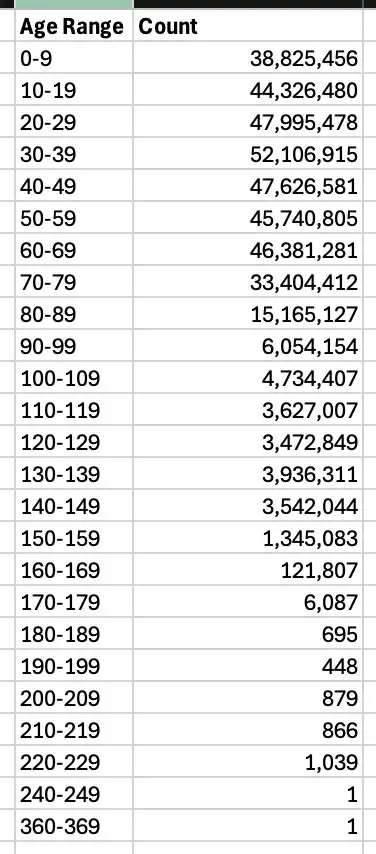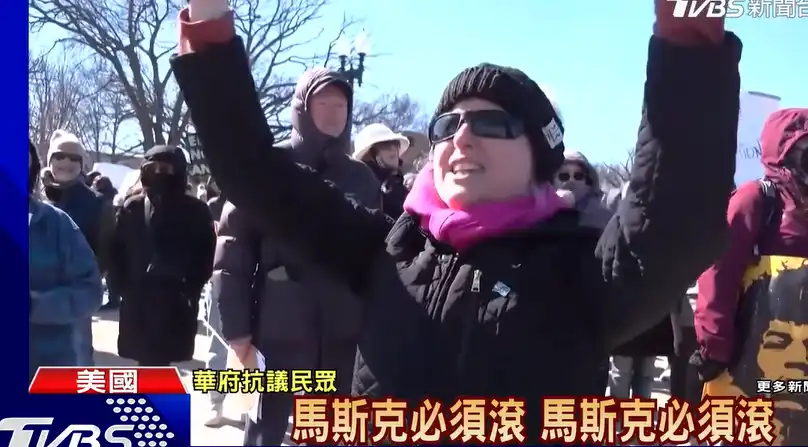On February 17, Musk posted a satirical message: "According to the social security database, these are the number of people in each age group who have the 'death' field set to FALSE! Perhaps 'Twilight' is real, and there are many vampires receiving social security." The accompanying image shows that the US currently has over 2,000 people over 200 years old receiving social security, with the "oldest" being over 360 years old. Clearly, this is fraud to claim social security benefits. The Government Efficiency Department is currently investigating the matter.

Since Elon Musk was appointed by the new US President Trump in January 2025 to lead the "Government Efficiency Department" (DOGE), this reform action to transform government agencies with a corporate mindset has quickly attracted global attention. During the World Government Summit from February 11 to 13, when asked about the mission of the Government Efficiency Department (DOGE), Musk said that government efficiency reform is like corporate transformation, just on a much larger scale. He used his own Twitter as an example, pointing out that the reform process reduced the workforce by 80%, but through technological improvements, achieved in one year what would have taken five years in the past. Through the official Twitter account "DOGE", the DOGE team has been pushing government cost-cutting and efficiency improvements with radical measures, bringing significant results but also controversy.
Here is a summary of the key recent actions of Musk's Government Efficiency Department:
On February 11, the Department of Agriculture terminated 18 contracts worth about $9 million; the Department of Education terminated 29 DEI training grants totaling $101 million and 89 contracts worth $881 million;
On February 13, the Department of Education verified the cancellation of $9 million in unnecessary spending contracts; the EPA canceled 3 DEI contracts, saving $45 million; and 58 other contracts were canceled, saving over $150 million in media, DEI, and consulting categories;
On February 14, 167 projects were canceled, saving about $115 million; the Department of Education terminated funding for four "Equity Assistance Centers" totaling $33 million; and the $50 million environmental justice grant to the Climate Justice Alliance during the Biden administration was canceled, as the alliance believes "climate justice is achieved through a free Palestine";
On February 15, 586 contracts with 10 agencies were terminated, with a ceiling value of $2.1 billion, and $445 million in savings were secured; the Department of Education terminated 70 DEI training grants totaling $373 million; 9 wasteful EPA DEI and environmental justice contracts were canceled, saving about $60 million; and $1.9 billion misappropriated from the Department of Housing and Urban Development (HUD) during the Biden administration was recovered, which can now be used for other purposes;
On February 16, DOGE canceled a series of foreign aid contracts totaling $729 million, including some seemingly outrageous projects:
$10 million for "voluntary male circumcision in Mozambique";
$97 million for the University of California, Berkeley to "cultivate a cohort of Cambodian youth with entrepreneurial drive";
$486 million to the "Alliance for Strengthening Electoral and Political Processes", of which $22 million was for "inclusive and participatory political processes" in Moldova and $21 million for voter turnout in India;
$29 million for "strengthening the political landscape in Bangladesh";
......
In addition to the large-scale budget cuts, Musk's Government Efficiency Department has also been streamlining government departments and auditing government financial systems, which has become two paths for Musk to gradually approach the center of power, also causing great controversy in American society.
Large-scale layoffs expanded to critical public sectors, raising concerns about social services
According to a report by CCTV News, as of February 16, the plan initiated by Trump and Musk to significantly reduce the number of federal government employees has already resulted in the dismissal of over 9,500 people. On February 16, local time, an internal email from the National Institutes of Health (NIH) showed that the original plan to lay off 1,500 people was adjusted to 1,165 people, with affected employees being placed on leave starting on the 17th. This adjustment is believed to be related to the pressure on public health services, but the specific layoff criteria have not been made public, raising questions about the continuity of medical research. In addition, several other government departments also announced layoff numbers and plans that day:
The Environmental Protection Agency said it had laid off 388 employees;
Probationary employees at two research agencies of the US Department of Agriculture have also been laid off, but it is not yet clear how many employees have been affected by this layoff;
The Centers for Disease Control and Prevention will be forced to lay off nearly 1,300 probationary employees, about one-tenth of the agency's total staff;
The Internal Revenue Service is preparing to lay off thousands of employees as early as next week;
The US Forest Service will lay off about 3,400 new hires;
The National Park Service will eliminate about 1,000 positions;
......
Such large-scale layoff plans have caused a huge uproar in the US. The Democratic Party has made sharp criticisms, and the public has also taken to the streets to protest. Changes in public sector personnel directly affect the quality of life of the public and the stable development of society.

Source: YouTube Channel TVBS
Sensitive Data Tug-of-War: Taxpayer Privacy vs. National Security Controversy
The Washington Post reported on February 17 that the DOGE team has requested access to IRS taxpayer information, claiming it is for auditing government spending efficiency, but has not clearly defined the scope of data use. This has led to strong opposition from privacy advocates and Democratic lawmakers, who say it could lead to data abuse or threaten citizen privacy.
Although the Treasury Department claims that DOGE only has "read-only" access, many government employees do not buy it, directly suing the Treasury Department for illegally granting the Musk team access to the payment system. Previously, the DOGE team had already analyzed sensitive data from the Department of Education using AI, which has undoubtedly exacerbated people's concerns about the lack of data security protocols. Data security is no small matter, especially when it involves sensitive information about government departments and the public. If vulnerabilities occur, it could lead to a crisis of trust.
In this tug-of-war over sensitive data, DOGE's radical experiments have already embarked on a path of no return. If successful, it may provide a completely new approach and model for global government reform, becoming a replicable example. But if it fails, the US will undoubtedly be mired in a quagmire of political division and social trust crisis. As Musk said on Twitter: "Either make the government run like a tech company, or be eliminated." The question is whether the US government can find the right direction and achieve efficient operation in this risky experiment, or the outcome remains unknown. And how this turmoil will eventually end is what the whole world is waiting to see.
Recent events show that DOGE's reforms have shifted from the initial "cutting contracts and departments" to deeper waters: touching on national security data, core public services, and party politics. Musk's Silicon Valley-style "disruption" has accelerated the process, but also exacerbated constitutional conflicts and social contradictions. If efficiency and credibility cannot be balanced, this experiment may become the most controversial chapter in the history of the US bureaucratic system.





